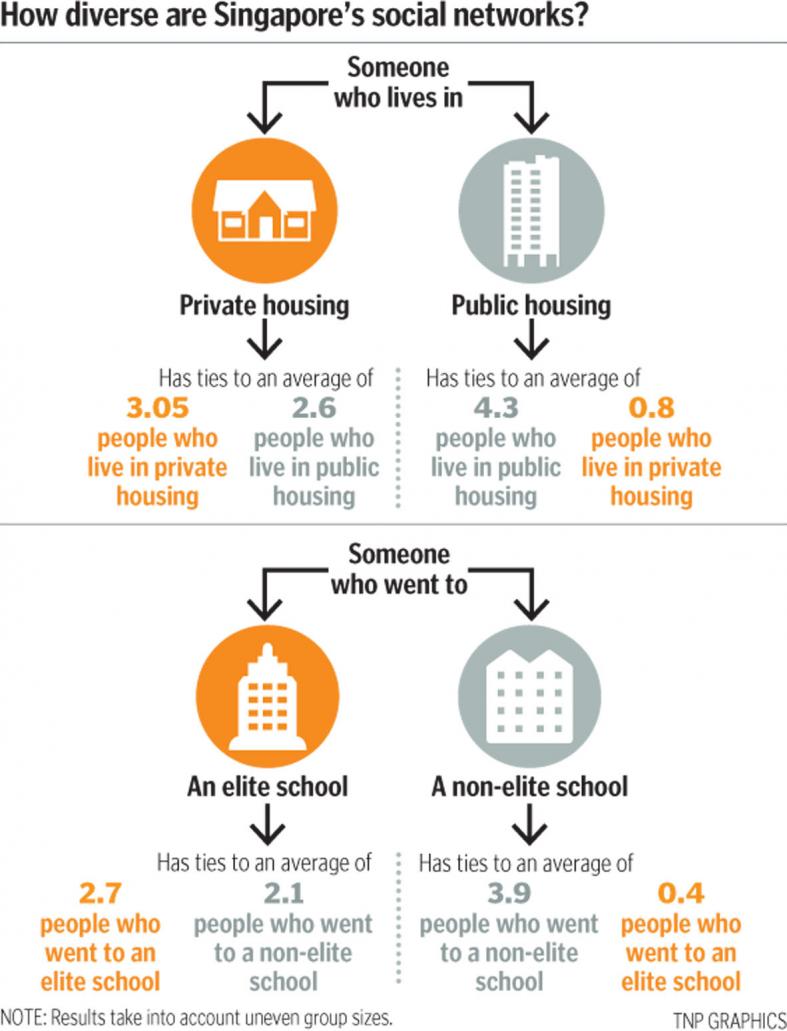Sharper divide among educational and housing status groups here
Divisions along school and housing types stronger than those across race and religion, say researchers
Those who studied in elite schools are less likely to befriend those from non-elite ones, a local study has found.
And those living in private homes are less inclined to form social relationships with their public housing counterparts.
These were among the results drawn from "A Study on Social Capital in Singapore" by the Institute of Policy Studies (IPS), which surveyed 3,000 people - 82 per cent of them Singaporeans and the rest permanent residents.
The findings of the study, which was supported by the Ministry of Culture, Community and Youth, suggest a clear class divide in Singapore, said its researchers - IPS deputy director (research) Dr Gillian Koh and National University of Singapore Associate Professors Vincent Chua and Tan Ern Ser.
IPS said in a press release yesterday: "We believe that more can be done to facilitate improved mixing, especially between people with different school backgrounds, and between those living in private and public housing."
Participants were asked to name and detail people in their social support networks in relation to their everyday lives from January to July last year.
These included - whom the participants would choose to confide in, whom they would play sports or socialise with, to even whom they would borrow money from, as well as whom they had difficulty relating to.
The researchers then measured their social capital, or the "good social outcomes that stem from these social networks," Dr Koh told The New Paper.
According to the study, an average Singaporean's social network has 5.8 friends or acquaintances.
Respondents could easily think of a friend of a different gender, age or race, but they were less likely to name someone from another status in terms of school and housing types.
While the study suggested Singapore's efforts in bridging gaps across race and religion are "paying off", Dr Koh said more can be done to close the divide based on educational status and housing type.
"What we found, surprisingly, is that Singaporeans are mixing across race, religious and nationality lines better than we expected. But social mixing across status boundaries is much lower and weaker," she added.
"We have put in a lot of effort to encourage and facilitate mixing across racial and religious lines... we must redouble our efforts to ensure the natural tendency for people to cluster around their status boundaries does not worsen, or in fact might improve so there will be a stronger, more cohesive and inclusive Singapore."
Prof Tan said this "class divide" could be dangerous, and society as a whole will gain if this can be avoided.
He told TNP: "Class divides can produce social tension, instability and lack of social well-being. A diverse network could produce cross-class understanding and, more importantly, social support and access to opportunities."
It takes the work of everyone, including the Government, to raise diversity in social ties, said the IPS researchers.
"We wish to encourage Singaporeans to take up opportunities to interact and make friends with people outside of their usual circles centred on a common race, language, religion, educational and housing background," they said.
"We also wish to encourage government agencies and community leaders to do more to create the structures and programmes that encourage such mixing."
Get The New Paper on your phone with the free TNP app. Download from the Apple App Store or Google Play Store now




